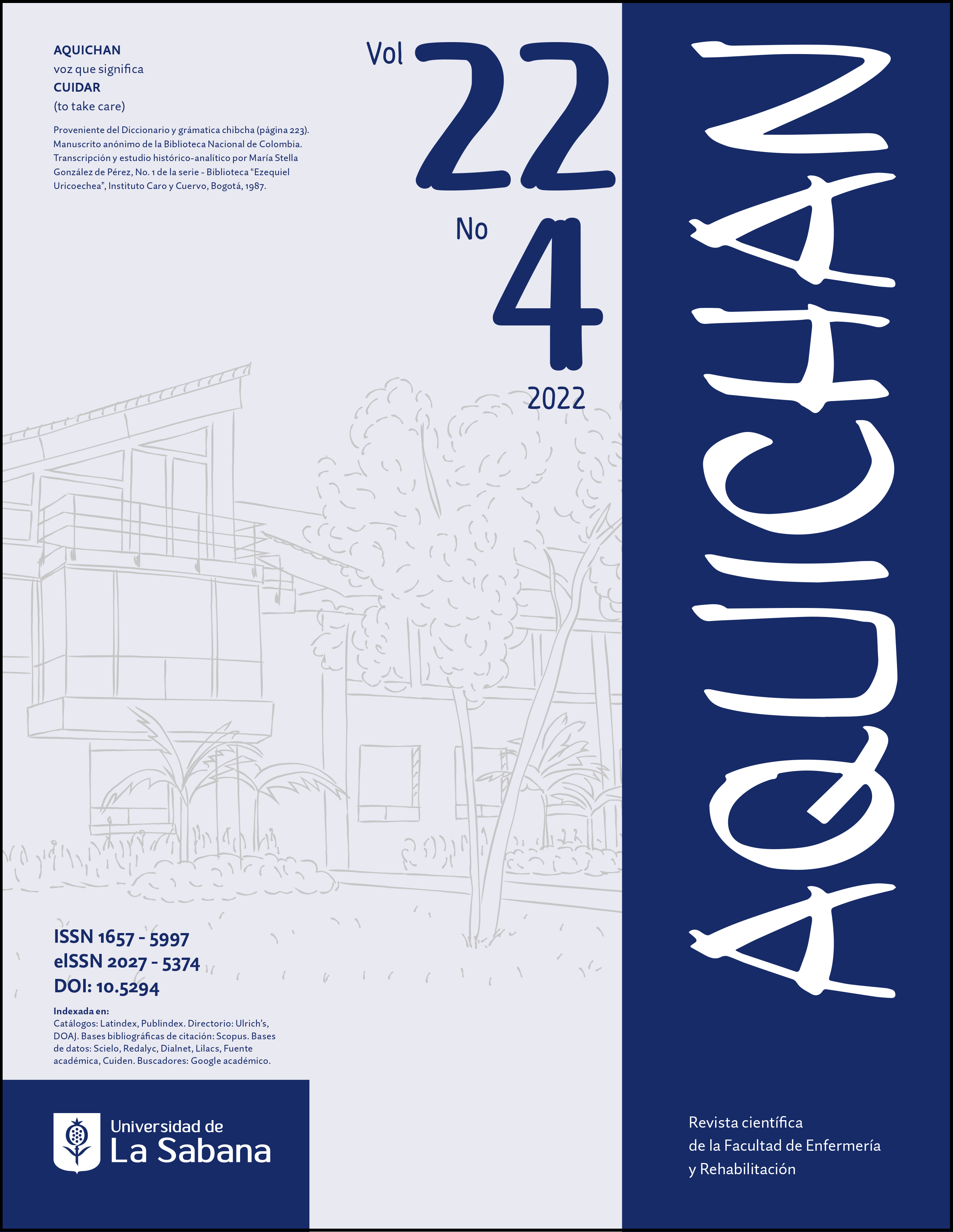Safety of Healthcare Workers in the Context of the COVID-19 Pandemic: Nurses’ Understanding
DOI:
https://doi.org/10.5294/aqui.2022.22.4.3Keywords:
Nursing research, occupational health, continuing education, coronavirus, pandemicAbstract
Objective: To understand the meaning of worker safety in healthcare during a pandemic from the perspective of nurses, based on interventions related to continuing education in health. Materials and method: This action-research study is based on the constructivist paradigm. The study was conducted between August 2020 and April 2021 through open individual interviews, mediated by guiding questions without prior validation. The interviews were conducted with 19 nurse managers of inpatient units who had previously participated in a schedule of continuing education interventions in a university hospital in the South region of Brazil. Research data were analyzed based on Minayo’s thematic content analysis. Results: The research data resulted in two thematic categories: “Reframing knowledge and professional practices” and “From banalization to resumption of preventive care.” The categories indicate that, in addition to specific and normative educational processes, it is necessary to promote self-reflection and individual and collective self-examination. Conclusions: From the understanding of nurses, the pandemic period aroused greater reflection and self-
examination among nursing/health professionals, especially concerning preventive health care, which is addressed as secondary.
Downloads
References
Remuzzi A, Remuzzi G. COVID-19: Protecting health-care workers. The Lancet. 2020;395(10228):922. DOI: https://doi.org/10.1016/S0140-6736(20)30644-9
Michaels D, Wagner GR. Occupational Safety and Health Administration (OSHA) and worker safety during the COVID-19 Pandemic. JAMA. 2020;324(14):1389-90. DOI: https://doi.org/10.1001/jama.2020.16343
Romero JGAJ, Salles-Neto FT de, Stuginski-Barbosa J, Conti PCR, Almeida-Leite CM. COVID-19 pandemic impact on headache in healthcare workers: A narrative review. Headache Medicine. 2021;12(2):75-82. DOI: https://doi.org/10.48208/HeadacheMed.2021.17
Teixeira CF de S, Soares CM, Souza EA, Lisboa ES, Pinto ICM, Andrade LR et al. A saúde dos profissionais de saúde no enfrentamento da pandemia de Covid-19. Ciênc. saúde coletiva. 2020;25(9):3465-74. DOI: https://doi.org/10.1590/1413-81232020259.19562020
Duprat IP, Melo GCM. Análise de casos e óbitos pela COVID-19 em profissionais de enfermagem no Brasil. Rev. bras. saúde ocup. 2020;45:e3045. DOI: https://doi.org/10.1590/2317-6369000018220
World Health Organization. Clinical management of severe acute respiratory infection (SARI) when COVID-19 disease is suspected [on-line]. Available from: https://www.who.int/docs/default-source/coronaviruse/clinical-management-of-novel-cov.pdf
World Health Organization (WHO) and International Labor Organization. COVID-19: Occupational safety and health for healthcare professionals [on-line]. Geneve; 2021. Available from: https://www.who.int/publications/i/item/WHO2019-nCoV-HCW_advice-2021.1
Morin E. Introdução ao pensamento complexo. Porto Alegre: Sulina; 2015.
Jacobs SD. A history and analysis of the evolution of action and participatory action research. The Canadian Journal of Action Research. 2018;19(2):34-52. DOI: https://doi.org/10.33524/cjar.v19i3.412
Backes DS, Obem MK, Pereira SB, Gomes CA, Backes MTS, Erdmann AL. Learning Incubator: An instrument to foster entrepreneurship in Nursing. Rev. Bras. Enferm. 2015;68 (6):1103-8. DOI: https://doi.org/10.1590/0034-7167.2015680615i
Mendes RM, Miskulin RGS. Content analysis as a methodology. Cad. Pesqui. 2017;47(165). DOI: https://doi.org/10.1590/198053143988
Brasil. Conselho Nacional de Saúde. Resolução n.º 466/2012. Dispõe sobre a realização de pesquisas com seres humanos [on-line]. Disponível em: https://conselho.saude.gov.br/resolucoes/2012/Reso466.pdf
Brasil. Comissão Nacional de Ética em Pesquisa. Ofício Circular n.º 2/2021. Orientações para procedimentos em pesquisas com qualquer etapa em ambiente virtual [on-line]. Disponível em: http://conselho.saude.gov.br/images/Oficio_Circular_2_24fev2021.pdf
Karlsson U, Fraenkel C. Covid-19: Risks to healthcare workers and their families. The BMJ. 2020;371:m3944. DOI: https://doi.org/10.1136/bmj.m3944
Karlsson U, Fraenkel C. Complete protection from covid-19 is possible for health workers. The BMJ. 2020;370:m2641. DOI: https://doi.org/10.1136/bmj.m2641
Chia R. From complexity science to complex thinking: Organization as simple location. Organization, 2016;5(3):341-69. DOI: https://doi.org/10.1177/135050849853003
Rosenhead J, Franco LA, Grint K. Complexity theory and leadership practice: A review, a critique, and some recommendations. The Leadership Quarterly, 2019;30(5):101304. DOI: https://doi.org/10.1016/j.leaqua.2019.07.002
Morin E. A religação dos saberes: o desafio do século XXI. Rio de Janeiro: Bertrand Brasil; 2001.
Backes DS, Zamberlan C, Colomé J, Souza MT, Marchiori MT, Erdmann AL et al. Systemic interactivity between Interdependent concepts of nursing care. Aquichan. 2016;16(1):24-31. DOI: https://doi.org/10.5294/aqui.2016.16.1.4
Backes DS, Santini T, Freitas CS, Naujorks AA, Backes MTS, Büscher A. The learning incubator: An innovative teaching and learning technology in nursing. Rev Esc Enferm USP. 2021;55:e20200048. DOI: https://doi.org/10.1590/1980-220x-reeusp-2020-0048
Osingada CP, Porta CM. Nursing and Sustainable Development Goals (SDGs) in a COVID‐19 world: The state of the science and a call for nursing to lead. Public Health Nurs. 2020;37(5):799-805. DOI: https://doi.org/10.1111/phn.12776
Lovato CZL, Dellazzana-Zanon SM, Wechsler RRF. COVID-19: Implications and applications of positive psychology in times of pandemic. Estud. psicol. 2020;37. DOI: https://doi.org/10.1590/1982-0275202037e200072
Lecompte F. Uncertainty is intrinsic to the human condition. [on-line]. 2020 [21 screens]. Available from: https://news.cnrs.fr/articles/uncertainty-is-intrinsic-to-the-human-condition
Backes DS, Malgarin C, Erdmann AL, Büscher A. nursing now and nursing in the future: The experience of the unexpected irruptions. Rev. Latino-Am. Enfermagem. 2021;29:e3453. DOI: https://doi.org/10.1590/1518-8345.4826.3453
Downloads
Published
How to Cite
Issue
Section
License
Copyright (c) 2022 Aquichan

This work is licensed under a Creative Commons Attribution-NonCommercial-NoDerivatives 4.0 International License.
1. Proposed Policy for Journals That Offer Open Access
Authors who publish with this journal agree to the following terms:
- The journal and its papers are published with the Creative Commons License Attribution-NonCommercial-NoDerivatives 4.0 International (CC BY-NC-ND 4.0). You are free to share copy and redistribute the material in any medium or format if you: give appropriate credit, provide a link to the license, and indicate if changes were made; don’t use our material for commercial purposes; don’t remix, transform, or build upon the material.









